
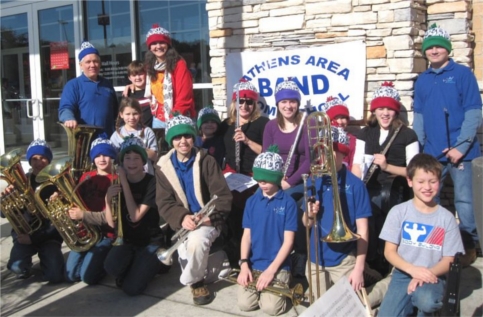


The Athens Area Homeschool Band is a group of home-school students who play traditional school-band instruments that live in and around the greater Athens, Georgia area. The band meets once a week for 2 hours during the traditional public-school year. Instructors for the group include former public-school music educators (who now home-school their own children) and degreed professional musicians. The group gives public performances several times throughout the year, including a performance at the state capitol for Homeschool Days. Participants also have the opportunity to participate in GMEA events such as District Honor Band and All-State Band.
 Karen Mullins
Karen MullinsKaren Mullins resides in Madison, GA with her husband and three sons- Nathan, Aaron and Seth. She received her Bachelors degree from the University of Georgia and her Masters degree from Bowling Green State University (Ohio) both in Music Education. She also studied, performs and teaches extensively on euphonium, trombone and tuba. After teaching public school music for five years, she and her husband decided to homeschool in 2004. Karen has been working with homeschool bands and music programs since 2001. She also enjoys camping, hiking and gardening with her family.
 Rachel Simmons
Rachel SimmonsHere we have info on Rachel Simmons. Rachel has a Masters Degree in Flute Performance from the University of West Virginia. Rachel has been homeschooling her three children for X years. Rachel is also active in the Athens Flute Choir.
Lets see what adding another paragraph will look like. Once upon a time there lived three little pigs. They were happy pigs, or so it seemed. They met for dinner daily and spent much time playing spades after their repast. Their personalities diverged somewhat on the issue of cuisine. Pigs are mostly herbivores, you see, though they are in fact a bit omnivorous. They dwelt in three separate houses: one made of straw, one made of sticks, and the last made of brick. On nights that they ate at the brick house, the pig that lived there served a delicious soup. He didn't have the heart to tell the others that the secret ingredient was bacon.
 Jennifer Bailey
Jennifer BaileyJennifer Bailey is the newest member of the AAHB staff. She holds a Bachelors in Music Education and a Masters in Music Education, both from the University of Georgia. After being in the public classroom for eight years (at both the high school and elementary school levels), Jennifer and her husband John decided to homeschool their children. Jennifer says, "I believe our first priority is to lead the band students spiritually; we as a band believe that God our Creator wants to have a personal relationship with us. Music is our passion, and this is the outlet we use to reach these students."
| February | 3 | |
| 10 | ||
| 9-10 | District 4 MS and HS Honor Band (Stephenson HS) | |
| 17 | ||
| 24 | Solo Festival | |
| March | 1-3 | GMEA All-State Band in Savannah, GA |
| 2 | ||
| 9 | ||
| 16 | Solo Festival | |
| 17 | Bandtastic (Rhinehardt College) | |
| 23 | after class voluntary placement auditions(int.&adv.) | |
| 30 | Lanier Gardens Retirement Home concert (2pm) | |
| April | 6 | NO BAND- Enjoy Good Friday! |
| 13 | ||
| 20 | Spring Concert | |
| 27 | after class voluntary placement auditions(int.&adv.) | |
| May | 4 | Beech Haven Baptist performance (time TBA) |
| 11 | ||
| 18 | AAHB Six Flags performance (intermediate & advanced bands) |
Members of the Athens Area Homeschool Band can expect to play one or more of the wind or percussion instruments typically found in school bands here in the United States. Complete beginners will usually spend four to six weeks on a recorder to help familiarize themselves with basic musical concepts before moving on to a regular band instrument in the Beginning Band.
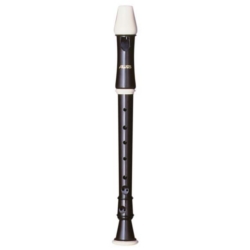 The recorder
The recorderDespite its use for beginners, the recorder is a legitimate performance instrument. Popular for use during the Renaissance period, the recorder is in fact a type of flute. It employs a fipple, much like a whistle, in order to produce a tone. This is in contrast to the transverse flutes, which require the user to blow across a hole to produce a tone. This ease of tone production is one reason the recorder is popular as a beginner's instrument, in addition to its low cost and lack of mechanical parts which are prone to break. Many Renaissance-style recorder consorts still exist today, and they specialize in playing music written for the recorder during the Renaissance period. These consorts use recorders of different sizes and pitch to produce harmonious sounds. The soprano, alto, tenor, and bass recorders are the most typical, though sopranino and contrabass recorders are seen occasionally. Experienced recorder players will often own and use more expensive wooden recorders. The recorders used in beginners' classes are usually soprano recorders made of plastic. One major drawback for the recorder is its lack of dynamic contrast (meaning it really only has one volume level), which is one reason it has taken a back seat to the more expressive modern wind instruments.
Among the standard wind band instruments, most students will start on one of the "basic five":
Some students may follow their recorder studies with one of these "color" instruments:
These instruments are usually much more expensive than the "basic five" and players are typically limited by what instruments the organization can provide.
Some students may end up playing percussion. Percussionists do not play a wind instrument, but must have a strong sense of rhythm and tempo as well as the ability to read melodic music notation on treble and bass clefs. They must learn a variety of techniques to play on a diverse set of instruments such as, but not limited to:
The organization usually owns these instruments, as the list is quite extensive and impractical for the individual percussionist to possess. Percussion students will usually use these instruments when rehearsing or performing with the band, but will have their own drum practice pad and practice bell set to hone their reading and rudiment skills outside of band meetings.
There is another instrument that has not yet been mentioned, for it does not fit well in any of the above lists. In the detail section that follows, we will begin with it.
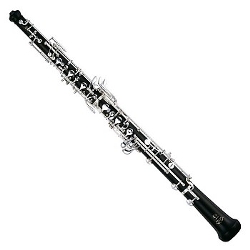 The oboe
The oboeThe oboe is a woodwind instrument featuring a "double reed", and has a very unique tone among the band instruments. It does not have a mouthpiece, and the joints of the instrument leave little room for adjustment, making it one of the more difficult instruments to tune. For this reason, there is usually only one oboe player per ensemble, and it is not uncommon for the rest of the ensemble to tune to the oboe to help eliminate intonation difficulties. The oboe has one of the most complicated key mechanisms among wind instruments, and requires a skilled instrument technician to to properly adjust it. While they are usually made of wood, beginning oboe players will often opt for a plastic oboe with a simplified key system to reduce cost. Even these "cheap" oboes will usually be very expensive relative to the other woodwind instruments, though.
The oboe's unique tone quality makes it an ideal instrument for haunting solo parts, and it fills this role quite well. A mature oboe sound is very beautiful, in stark contrast to the hideous noise most beginners will make. Parents of oboe students are encouraged to be patient! Oboes are relatively high-pitched instruments, and are typically seated front and center near the flutes.
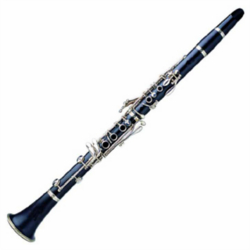 The clarinet
The clarinetAmong woodwinds found in bands, the clarinet is the most common. Although it bears a superficial resemblance to the oboe, it differs significantly. The clarinet has a single reed that produces the vibration necessary for it to sound. The reed is held onto a mouthpiece with a device known as a ligature. The clarinet is assembled in 5 parts: the mouthpiece, barrel, upper joint, lower joint, and bell. Tuning is usually accomplished by adjusting the fit of the barrel on the upper joint. It is not unusual for there to be a large number of clarinetists in a band, and sometimes some of these players will play a larger, lower pitched variant known as a bass clarinet when they are available. The key mechanisms of the clarinet are not particularly complicated, but many of the keys require the player to cover the tone-holes of the instrument with his or her fingers. As with oboes, the bodies of the fancier clarinets are made of wood, and the beginner's instruments are plastic. Clarinets are among the least expensive wind instruments.
Clarinets fill multiple roles in the band. They function well as a soloist's instrument, but their tone also blends quite well for background harmony. The soprano clarinets are among the more high-pitched instruments of the band, and are usually seated on the front row near the flutes and any oboes.
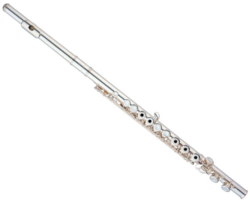 The flute
The fluteAnother common woodwind in school bands is the flute. The whole family of instruments known as "flutes" is in fact quite large and diverse, but the instrument we are usually referring to is in fact a C soprano transverse flute. The recorder as mentioned earlier is a type of flute, but the transverse flutists produce their tone by blowing across a hole in the headjoint, rather than into a fipple as on the recorder. This technique can take some getting used to, but beginners with an aptitude for flute will usually have little difficulty mastering it. The flute is usually assembled in three parts: the head-joint, the body, and the foot-joint. The flute is held out to right side of the player's head, so good posture and positioning are especially needed to play flute well. The key mechanisms of the flute are not overly complicated, but the accoustics of the instrument are not as forgiving as the clarinet. Where competent clarinetists can often "blow past" leaky keys, the flute will need to be in better adjustment for the same level of performance.
Flutes are almost always made of metal, with some of the high-end professional instruments employing precious metals such as silver, gold, and even platinum! For this reason, flutes have the widest price range between the student models and the professional models. Student flutes are usually in the same price range as student clarinets, but the most expensive professional flutes can cost as much as a luxury car or a house! Beginners' flutes are usually of the "closed hole" or "plateau" variety, and are made of a nickel alloy with silver or nickel plating. Professional models will have holes in the keys under the left middle and ring fingers, as well as under the right index, middle and ring fingers. They will also usually have an additional key on the foot joint enabling the instrument to play a half-step lower than the student instruments, as well as have a richer tone.
Flutes and their miniature versions the piccolo are the highest-pitched instruments in the band. They are almost always seated on the front row.
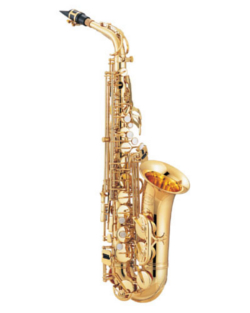 The saxophone
The saxophoneThe saxophone is one of the newer wind instruments, having only been invented in 1846. The inventor Adolphe Sax (for whom the instrument is named) originally intended for there two be two families of saxophones: one for military bands, and one for orchestras. The band line consisted of instruments in the keys of E-flat and B-flat while the orchestral saxophones were manufactured in the keys of F and C. Only the band line survives today, as the saxophone never really caught on as an orchestra instrument. Some relics of the orchestral line survived into the early 20th century as jazz solo instruments, most notably the C tenor saxophone, also called the C-Melody.
Saxophones are almost always made of brass, but have a mouthpiece that is very similar to the clarinet, and the technique of tone production is very similar to the clarinet. The fingering system and key layout is closely related to the modern flute. For these reasons, it is not uncommon to find players whose primary instrument is flute or clarinet but double on the saxophone.
As a band instrument, the saxophone's primary role is as a harmony or color instrument, and it frequently plays parts that would be traditionally covered by horn, trombone, or euphonium. It will sometimes play melodies or solos, particularly when an arrangement has a jazz flavor.
The trumpet is the highest-pitched member of the brass family of wind instruments. Brass instruments (so called because they are almost always made of brass) are played by vibrating one's lips in a cup-shaped mouthpiece, and do not involve reeds. Trumpets have a very long history in performing ensembles, but their design has changed rather drastically over the years. Modern trumpets are equiped with valves which
A PDF version of the original handbook is available here
Welcome to the Athens Area Homeschool Band Program! We are excited about teaching and making music with your student this year. Music teaches so many essential life skills: responsibility, social skills, creativity are just a few. Higher physical and mental skills are also added benefits. Besides, music is a fun skill that can be enjoyed at many different levels throughout life. What a wonderful journey we are now embarking on - TOGETHER!
The best way to get the most out of your band experience is through COMMUNICATION and COMMITMENT. It is very important to keep the lines of communication open between you and myself to maximize your students educational experience. A calendar of this year's events is attached to this information. Also, the band's blogspot is always available and updated regularly with current information. Please make sure I have your email address! I frequently send out important messages to band parents via this efficient and inexpensive means.
Band is and should be fun, but it requires a COMMITMENT to work hard by practicing daily and coming to class prepared (through practice) to learn and improve. Our band can only be as strong as it's members- we are a musical team. A group of practicing and prepared band students makes for an enjoyable experience for both musician and listener alike.
Your support is essential to your student's success. Please get involved in our planned activities. Students always need encouragement and patience when learning something new - whether it be a musical instrument or anything else. Please encourage your student to practice regularly- it is the key to their musical success!
Generally, 20-30minutes per day to get minimum results on the instrument.
Students should practice enough to keep up with the music in class. Class time is considered full band rehearsal time and for us to teach the music, not personal practice time. Each student must be responsible for mastering their own music after they have been taught how to play it.
Students attaining a superior at Solo and Ensemble and those who make District Honor Band practice every day.
Students who make All-State Band practice every day - A GREAT DEAL! During the final weeks leading up to the auditions, an hour or two per day is what students who make All-State usually put in.
All classes take place on Fridays at Beech Haven Baptist Church (see attached Band Calendar for specific dates). Class times are as follows:
1:00-2:00 p.m. Beginning Band, Intermediate Band (meeting simultaneously)
2:00-3:00 p.m. Advanced Band
The bands will perform several times during the school year. All performances will be announced well in advance through our band calendar given out at the beginning of the academic year. Students are expected to be at every performance unless there is a life- threatening emergency that has been discussed prior to the performance with the director. We need all students to participate in order for the group to look and sound its best!
Fees are broken down as follows:
Registration $75 per child (3rd child and subsequent $35 each) * includes one required band polo shirt per child
Tuition $30 per month (September through May)
Cash and checks are accepted. Checks should be made payable to Karen Mullins and Rachel Simmons. Tuition is due at the desk in Building D on the first Friday of each month. Please be prompt in your payment.
Solo and Ensemble (which is highly suggested but optional) requires an estimated fee of $15.00. This covers the cost of music, an accompanist, the judge’s honorarium, and an award (if applicable).
District/All-State Band auditions are an estimated $15.00.
Lost music must be replaced at a cost of $1.00 per sheet.
* A band polo shirt is included with each student's registration. This shirt will be worn each Friday to better identify our students on campus and to build a greater team spirit.
Our concert dress is as follows:
Individual progress is measured through weekly or biweekly pass-offs and class participation. Extra musical challenges are always available through Solo and Ensemble Festival, District and All-State auditions, and band festivals.
Trumpet - valve oil, slide grease, cleaning rod, cleaning snake, soft polishing cloth
Trombone - slide oil or trombone slide kit, slide grease, cleaning snake, soft polishing cloth
Horn - rotary valve oil, slide grease, soft polishing cloth
Euphonium and Tuba - valve oil, slide grease, cleaning snake, soft polishing cloth
You will need to keep on hand:
Flute - your flute rod (for swabbing out instrument), cork or tuning slide grease
Clarinet and Saxophone- a box of reeds (3 in your case at all times), a reed case for four reeds, cork grease, a swab, mouthpiece cap Oboe - a good supply of reeds, cork grease, a swab, empty film canister (for soaking reeds PRIOR to rehearsal)
Bassoon - same as oboe EXCEPT a big enough empty pill bottle for soaking your reeds PRIOR to rehearsal, a pipe cleaner for gently cleaning out your reeds